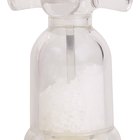
Saltpeter is an ancient food additive. Prehispanic Mesoamericans fashioned tortillas from maize and saltpeter. The Chinese invented “sorbet” by chilling syrup to sub-freezing using saltpeter and snow. A first century Roman named Epicius, wrote a recipe to promote regularity entitled “Oxyporum” or “Easy Passage,” listing salt peter and dates as ingredients. Today salt peter is used mainly in meat production--as a preservative, to prevent botulism, and as a color fixative and flavor agent.
A Preservative and Curing Agent
Salt peter is a mineral called potassium nitrate. It is used to cure ham and other preserved meats and fish. Curing draws moisture away from meat and reduces bacteria. The U. S. Department of Agriculture Food Safety Inspection Service regulates the use of salt peter, which is toxic at high levels, to “3.5 ounces per 100 pounds of meat for dry cure or 7 pounds per 100 gallons of liquid cure.”
Prevention of Botulism
Botulism is a bacteria called “Clostridium Botulinum,” which can cause a lethal form of food poisoning. Salt peter is an antimicrobial which is added during the curing process to kill the bacterium that causes botulism. Sodium nitrate is used as an additive in commercial meat processing as well as in home curing of pork products, beef, or fish.
Color Fixative and Flavor Agent

The nitrates added to meat during the curing process cause a chemical reaction that alters the natural pigments in meat to change from brownish/grey to a rosy pink hue. Nitrates also provide the distinct “cured” flavor and texture to ham, bacon, pastrami and salami. Without the addition of nitrates, that delicious hunk of corned beef would just be an ordinary slice of grayish-brown beef brisket.
Warning Regarding Salt Peter in Foods

Potassium nitrate is used in pesticides and explosives. It is found naturally in soil and in vegetables. According to Mayo Clinic nutritionist, Jennifer Nelson, “Nitrate preservatives damage vessels, reduce insulin secretion and impair control of blood glucose–which may increase risk for disease and diabetes.” If you must cure your own sausage or bacon at home, take careful measurements of curing salts by strictly following the manufacturer’s recommendations. Avoid excess consumption of nitrates.
Related Articles

How to Use Sea Salt for Canning

How to Make Salt Brine

Does Boiled Ham Have Nitrites?

How to Pickle Beef Brisket

A Saltpeter Substitute for Curing Ham

How to Brine a Smoked Beef Brisket

How to Do Corned Pork

The Effect of Salt on the Tenderness of ...

How to Make Dried Meat

How to Salt Cure Jerky

Food Sources of Phosphatidylcholine

The History of Smoking Meat

Nutritional Information for Johnny's ...

List of Foods That Are Commonly ...

What Foods Provide Calcium D-Glucarate?

How to Cook Stew in a Slow Cooker

How to Dry Meat With Salt

How to Cook Muskrat

Types of Corned Beef

How to Make Venison Bratwurst
References
Writer Bio
Cynthia Chase was born in Hollywood and now lives in Hawaii. She has been a writer since 1979, specializing in health, travel and legal topics. Chase holds a Bachelor of Arts in journalism from Brigham Young University.
Photo Credits
Bacteria Colonies image by ggw from Fotolia.com